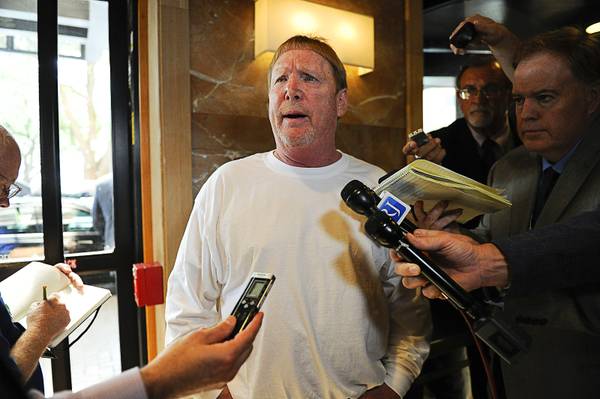Related Stories
First, they persuaded Nevada legislators to commit the largest public subsidy in American history toward their new $1.9 billion stadium and practice facility.
Now the Raiders persuaded the Henderson City Council to shave $6.05 million off the $12.1 market value of 55 acres of land to build that practice field and corporate headquarters near the city’s executive airport.
In both cases, the team’s winning argument in favor of corporate subsidy reads the same: The return you reap will be worth the dollars you sow.
Henderson’s council voted unanimously on Tuesday night to move forward toward a directed sale of land to the Raiders, a decision that allows city officials to use a Nevada law allowing no-bid sales at under-market prices when they deem it in the public interest.
“I think this is a huge return on investment for the investment the city of Henderson is making,” Henderson Mayor Debra March said before the vote.
The Raiders plan to spend as much as $75 million to construct their headquarters on the huge parcel off St. Rose Parkway near the M Resort. The team’s oft-cited budget includes $1.8 billion for its 65,000-seat domed stadium at Interstate 15 and Russell Road, and $100 million for its corporate headquarters. Nevada’s $750 million taxpayer investment evolved from those estimates.
City Councilman John Marz said the availability of that land for sale by the city required years of work, beginning with scrapped plans for mixed-use development and failed attempts to build homes that would have been too close to the executive airport’s flight path. The city negotiated land swaps with previous home developers for infill parcels in other Henderson locations to assemble that 55-acre parcel within an area of 600 acres slated for office and industrial use.
“We’ve been patient with this piece of land,” Marz said. “It’s not like we had to give it away. We’ve had people interested in it, but not the type of companies that we wanted there. When the Raiders came knocking on our door, we said this is our golden opportunity.”
Marz said previous inquiries would have resulted in warehouses on the land.
If the sale receives final council approval in February, the Raiders will pay roughly $110,000 per acre for the land. The team in May paid $77.5 million for 62 acres — $1.25 million per acre — to private owners for its stadium site, though that parcel sits in a much more desirable location adjacent to the Strip. The initial asking price for that land was $100 million.
Asked if the city initially offered the discounted rate or if the Raiders requested the half-price deal, Marz said, “It was a negotiation. Of course they asked, just like everybody else asked.”
That negotiation progressed well, Marz said.
“It was a win-win. The devils are in the details, and so some of those things with their attorneys in California got a little bit sticky, but not contentious,” Marz said. “Overall, we agreed right away what was good for them and what was good for us.”
City staff presented to the council estimates of the facility’s impact on Henderson’s economy. Their presentation contends similar projects generate about $210 million of tax impact over 10 years once fully constructed. Additional spending on some of the city’s 5,000 hotel rooms by visitors and team clients could generate added revenue as well, said Barbra Coffee, the city’s director of economic development/tourism.
March also pointed out that Henderson will begin collecting property tax on the land, which it obviously has not while owned by the city.
The team plans to create 250 nonplaying jobs stationed at the headquarters, though many of those positions could be filled by employees relocating from the current Raiders home in Alameda, Calif. Raiders stadium consultant Don Webb said the facility will need to be completed by spring 2020 to accommodate team staff preparing for the upcoming NFL season later that year.
Marz anticipates the facility jump-starting development in adjacent areas of west Henderson, long a goal of the city’s economic plan.
“We’re going to see industry go there, we’re going to see corporate headquarters there,” Marz said. “The Raiders are going to be a magnet.”
Webb, who declined to answer media questions following the meeting, said in his address to the council that the team’s Las Vegas-based stadium represents only part of its root structure in the region.
“That’s where the games will be played, but that won’t be the home of the Raiders,” Webb said. “The home of the Raiders will be in Henderson.”

